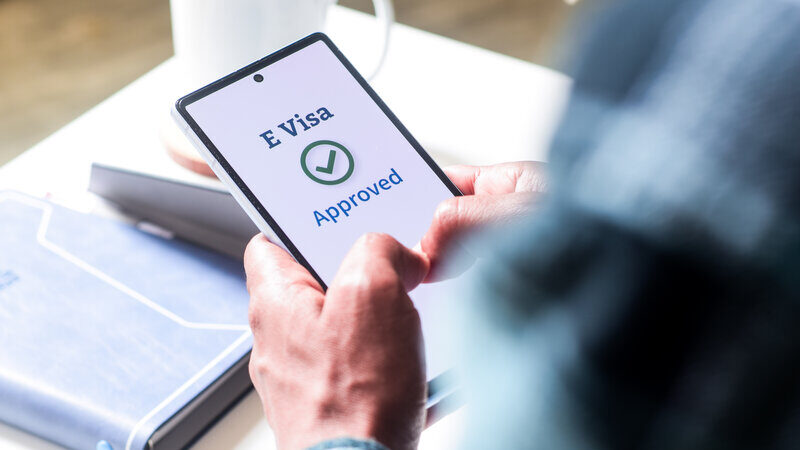
UK eVisa Rollout: Key Updates and Guidance

In This Article
1. What is a UK eVisa?
A UK eVisa is a secure digital record that contains details of an individual’s immigration status in the United Kingdom. It replaces the need for physical documents such as Biometric Residence Permits (BRPs) by consolidating a person’s identity information and immigration permissions in an online format. An eVisa records key details such as the type of visa held, the duration of permission to remain, and any specific conditions that apply – for example, whether the visa holder is permitted to work or study.
More information can be found in eVisa System: Check Your digital UK Immigration Status Online.
The system has been designed to simplify the way immigration status is evidenced and shared. Individuals with an eVisa can use the digital record to confirm their right to work and right to rent property, or access public services in the UK. By moving to a fully online model, the Home Office aims to reduce the reliance on physical documentation, which can be lost, stolen or damaged, and to improve the overall efficiency and security of the immigration system.
2. Who Is Eligible to Access a UK eVisa?
Most individuals granted permission to enter or remain in the UK for a period of more than six months are eligible to receive an eVisa. Those with shorter grants of permission – typically six months or less – may also be given access to an eVisa if their visa falls into certain categories, such as work or study routes.
When a decision is made on a UK visa application, the Home Office will confirm whether an eVisa will be issued. This information is provided directly to the applicant at the point of decision, meaning that there is no separate application process to request an eVisa in most cases.
3. Exemptions from the UK eVisa Requirement
Not everyone entering the UK will be issued with, or required to hold, an eVisa. Certain groups remain outside the scope of the system. For example, individuals visiting the UK with an Electronic Travel Authorisation (ETA) or on a Standard Visitor visa do not require an eVisa. Similarly, those who hold an EU Settlement Scheme Family Permit or who are exempt from immigration control – such as diplomats and individuals with a legal “right of abode” in the UK – will not be provided with an eVisa.
People who hold immigration status in the Channel Islands or the Isle of Man are also not included. Where an eVisa is required, it will be accessed via a UKVI account. Parents or guardians may create and manage UKVI accounts on behalf of children.
For asylum applicants who receive a positive decision, the Home Office will automatically create a UKVI account and corresponding eVisa within 14 days of the decision being issued. The asylum decision letter will confirm when the account and eVisa are available.
4. Should I Keep My Expired Biometric Residence Permit (BRP)?
Even after it has expired, it is advisable to retain your BRP. Expired BRPs can still be used for up to 18 months beyond the expiry date to create a UKVI account or to generate share codes that prove your right to work or rent. They can also be used when making further applications for leave to remain, as applicants can often reuse the biometric information contained in their existing card rather than attend a visa application centre again.
See our previous article: eVisa System Update: Biometric Residence Permit Holders Can Now Apply For An eVisa.
5. What If I Never Held a Biometric Residence Permit (BRP)?
Individuals who possess older forms of physical immigration documents, such as passport vignettes or wet-ink stamps, are encouraged to make a free No Time Limit application. This will allow them to transfer their status to a digital eVisa format. Further information on No Time Limit applications can be found in our previous article: ILR But No eVisa? How to Make a No Time Limit (NTL) Application.
It is worth noting that holders of these legacy documents are still able to use them to evidence their immigration status in the UK, particularly where they have indefinite leave to remain. The Home Office website confirms:
- You can continue to use your physical immigration document, for example a wet ink stamp or vignette (sticker) that shows you have indefinite leave to remain.
However, moving to an eVisa will help ensure that status can be proved more easily and securely, both in the UK and when travelling abroad.
6. Will My Travel Be Affected by the eVisa Rollout?
The Home Office has confirmed that eVisas are intended to streamline the border process for travellers. Most immigration permissions will be checked digitally against passport details as passengers pass through the border, either using automated e-gates or through the online View and Prove service.
To avoid potential delays, eVisa holders should ensure that their UKVI account is kept up to date with their most recent passport or travel document details. Creating a share code before travelling – which remains valid for 90 days – can also be helpful as it provides an alternative method of proving immigration status if required.
Travellers should also check the entry, exit and transit requirements of any other countries they plan to visit, as some foreign authorities may request evidence of UK immigration status.
Our article Travelling With an eVisa: Steps to Follow provides further information.
Since 2 June 2025, expired BRPs and EU Settlement Scheme Biometric Residence Cards (BRCs) can no longer be used as evidence of permission to travel to the UK. Although there was a limited transitional period during which carriers could accept these expired cards, that arrangement has now ended. Border Force will continue to verify all passengers’ immigration permission at the border, and alternative mechanisms are in place should carriers have any difficulty checking an individual’s eVisa.
7. What Are the Benefits of Using an eVisa?
The Home Office highlights several advantages to the eVisa system. Because eVisas are digital, they cannot be lost, stolen, or physically damaged. They allow visa holders to prove their rights quickly and securely while only sharing the information necessary for the purpose at hand.
The eVisa system also reduces the administrative burden on applicants. Fewer people will need to surrender their passports to the Home Office during applications, and there is no need to wait for physical documents to be delivered. Through their UKVI account, individuals can update their personal information – such as changes to name, nationality, or travel documents – and ensure their records remain current.
In addition, several government departments and public services, such as the Department for Work and Pensions and the NHS in England and Wales, can access immigration status information directly. This means that individuals will not always need to present proof of status in order to access benefits or services.
8. Help with eVisa Access or Technical Issues
Those encountering difficulties accessing their eVisa or navigating the UKVI online system can seek support from the Home Office Resolution Centre. The centre can assist with setting up a UKVI account, resolving technical issues and providing guidance on how to use the digital immigration status service.
For individuals who lack confidence with online systems, an Assisted Digital Service is also available. This service can provide in-person or remote support for using the UKVI account system. Further information on how to access these services is available on the GOV.UK website.
You can also refer to our article eVisa Mistakes and Errors and How to Correct Them.
9. Contact Our Immigration Barristers
If you need advice about accessing your eVisa, resolving issues with your UKVI account, or understanding how the rollout of the eVisa system may affect your immigration status, our immigration barristers in London can assist. Please contact us on 0203 617 9173 or complete the enquiry form below to arrange a consultation.
10. Frequently Asked Questions
What is a UK eVisa?
A UK eVisa is a secure digital record of your identity, immigration status and the conditions attached to your stay in the UK. It replaces physical documents such as Biometric Residence Permits (BRPs) and allows you to prove your rights in the UK digitally.
Who can get a UK eVisa?
You are usually eligible for a UK eVisa if you have permission to be in the UK for more than six months. Some individuals with short-term work or study visas may also be eligible. Your eligibility will be confirmed when you receive your visa decision.
Do I need a UK eVisa if I’m only visiting?
Not everyone needs a UK eVisa. You will not need one if you are visiting the UK with an Electronic Travel Authorisation (ETA), hold a Standard Visitor visa, have an EU Settlement Scheme family permit, are exempt from immigration control (such as diplomats or those with right of abode), or have permission to stay in the Channel Islands or the Isle of Man.
How do I access my eVisa?
To access your eVisa, you must create a UKVI account. If you are a child, a parent or guardian can set up and manage the account on your behalf.
What if I was granted asylum?
If you have been granted asylum, your UKVI account and eVisa should be created within 14 days of the positive decision. Details should be included in your asylum decision letter.
Should I keep my expired Biometric Residence Permit (BRP)?
Yes. Even if your BRP has expired, it can still be used for up to 18 months to set up a UKVI account, generate share codes for right to work or rent checks, and reuse stored biometrics in future immigration applications.
What if I never had a BRP?
If you hold a legacy document such as a vignette or ink stamp in your passport, you are advised to make a free No Time Limit (NTL) application in order to obtain an eVisa.
What is a share code and do I need one when travelling?
A share code allows you to prove your immigration status online. While not always required, generating one before travel can reduce delays if you are asked to show evidence of your status. Share codes are valid for 90 days.
What if I face technical issues accessing my eVisa?
If you experience difficulties creating your UKVI account or accessing your eVisa, the Home Office Resolution Centre can provide support. Additionally, the Assisted Digital Service offers help with IT-related issues for those struggling to use the online system.
What are the advantages of using an eVisa?
An eVisa offers several benefits. It cannot be lost, stolen or damaged. It allows visa holders to prove their status securely and instantly while sharing only the necessary information. Applicants no longer need to submit or collect physical documents and can update their personal details easily through their UKVI account. Many UK government services can also access immigration status information directly, without requiring the visa holder to present additional proof.
Please note that the information provided in this article is for general guidance only and is based on the immigration rules and policies in force at the date of publication. Immigration law and Home Office policy can change frequently, and requirements may vary depending on individual circumstances. Legal advice should always be sought in relation to your specific situation.







